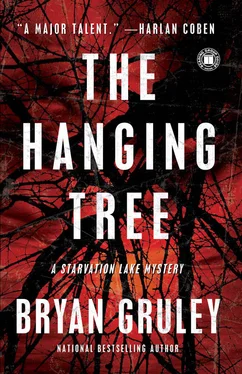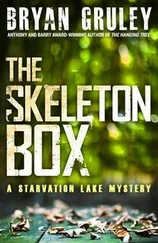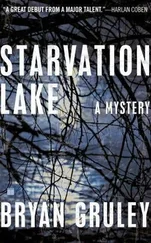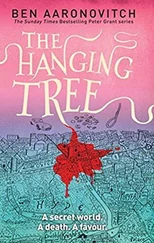Bryan Gruley - The Hanging Tree
Здесь есть возможность читать онлайн «Bryan Gruley - The Hanging Tree» весь текст электронной книги совершенно бесплатно (целиком полную версию без сокращений). В некоторых случаях можно слушать аудио, скачать через торрент в формате fb2 и присутствует краткое содержание. Жанр: Триллер, на английском языке. Описание произведения, (предисловие) а так же отзывы посетителей доступны на портале библиотеки ЛибКат.
- Название:The Hanging Tree
- Автор:
- Жанр:
- Год:неизвестен
- ISBN:нет данных
- Рейтинг книги:3 / 5. Голосов: 1
-
Избранное:Добавить в избранное
- Отзывы:
-
Ваша оценка:
- 60
- 1
- 2
- 3
- 4
- 5
The Hanging Tree: краткое содержание, описание и аннотация
Предлагаем к чтению аннотацию, описание, краткое содержание или предисловие (зависит от того, что написал сам автор книги «The Hanging Tree»). Если вы не нашли необходимую информацию о книге — напишите в комментариях, мы постараемся отыскать её.
The Hanging Tree — читать онлайн бесплатно полную книгу (весь текст) целиком
Ниже представлен текст книги, разбитый по страницам. Система сохранения места последней прочитанной страницы, позволяет с удобством читать онлайн бесплатно книгу «The Hanging Tree», без необходимости каждый раз заново искать на чём Вы остановились. Поставьте закладку, и сможете в любой момент перейти на страницу, на которой закончили чтение.
Интервал:
Закладка:
A noise came from the concession stand. I turned and saw a cardboard box marked Koffee-Kleen Filters appear on the counter. Whoever drove that Dodge was working back there-probably a kid a year out of high school who’d work in rinks and on construction sites between unemployment checks his whole life without ever leaving Starvation Lake. I ducked my head and skittered around the corner of the rink boards to my right, hoping no one had seen me.
Staying low, I scrambled along behind the benches and penalty boxes toward the back of the arena. The floor peeled up in places. Chilly drafts blew over me through thin cracks in the walls. An electrical outlet box hung haphazardly off the back of the announcer’s box, spewing bare wires. Puddles had formed where water had dripped through the sieve of a roof. Even though the Rats were finally winning again, skating stride for stride with the downstate teams for the first time in years, the town was letting the rink go to pot.
The town council, chaired by none other than Elvis Bontrager, had planned the year before to pay for refurbishments. Then Laird Haskell showed up at a council meeting one night with a box of glossy blue-and-gold folders embossed with the slogan “River Rats: Return to Glory.” He had a goaltender son who would keep other teams off the scoreboard and a bank account that would build the finest hockey facility in Michigan, complete with a weight room, two Zambonis, a bar called the Stanley Club-and a new scoreboard with a video screen that would show replays of his son’s brilliant saves. “We’ll build this,” he told the council, “and the championships will come.”
The council, without asking a single hard question about when or where he was going to get the money, gladly set aside the plans to fix the old rink and started shoveling our tax dollars toward helping Haskell. What reason was there to doubt him? He was a wealthy man-just look at his enormous house on the lake. Why would he propose a new rink if he couldn’t pay for it? Why throw money at the old rink when a free one was there for the taking?
At the back of the arena, I looked back over the top of the boards toward the concession stand and saw Johnny Ford doing something at the frozen yogurt machine. So that was his Dodge in the lot. He wasn’t out of high school yet. Either he didn’t have morning class or he was skipping.
He hadn’t seen me, I decided.
I crept past the two extra goalie nets leaned against the back wall and into the high-ceilinged bay where the Zamboni stood dripping water on a concrete floor. Johnny must have run it just before I’d arrived. I walked around the Zam once slowly, smelling gasoline, looking for anything that might give me an inkling as to how Gracie had wound up in the shoe tree.
Three tall plastic buckets embossed with Miller Lite logos sat along the back wall, one filled with rags, another with clotted snow. Next to the buckets stood a broom-sized squeegee and a pair of shovels. Along a side wall stood half a dozen carbon-dioxide tanks beneath a fuse box.
I glanced once more out the Zamboni bay to make sure Johnny wasn’t coming, then ducked under the yellow police tape strung across the doorway into the shed that Gracie had called home for the past few months.
I smelled something like incense mixed with the unmistakable odor of marijuana. The town had so lost interest in the rink that nobody even cared if the Zamboni driver smoked dope. Maybe that’s why Gracie had been turned down for a job at the new rink.
The floor in Gracie’s home was concrete. A scuffed wooden workbench ran alongside the wall to my left. A pegboard above the bench was empty, maybe because Gracie was too short to reach it. The bench was strewn with tools, cans of oil and paint and WD-40, greasy rags, some purple-and-orange marking pens, and an old Detroit Red Wings cap frayed around the bill. Gracie had worn the cap whenever she ran the Zam, her fading reddish hair streaked with silver straggling out the back.
I stopped for a second and thought, She must’ve taught herself to use the tools to keep the Zam in working order. I had never given it a thought before she died, when my pals and I were playing and she was driving the Zam. Before she returned to town, I had never known she was handy around machinery, that she didn’t mind getting dirt under her sparkly pink-and-purple fingernails. Nor did I have the slightest idea what she had done for a living during her years downstate. Never cared either.
When Gracie last lived in Starvation, she’d slung ice cream cones at the Dairy Queen. Business was especially good on her Friday nights because she always wore the tiniest, tightest top she could find, and boys would come all the way from Torch Lake to flirt. The luckiest one would get a cone that came with a wink and a question: “Extra sprinkles tonight?” More than a few times, the lucky one was Soupy. And Soupy being Soupy, I was never short on the details of what happened in the backseat of his Chevy Nova or the woods around Gracie’s mom’s trailer. “The Gymnast,” he took to calling her, or sometimes “Nadia.”
Beyond the bench stood an old wooden filing cabinet, a small refrigerator, and Gracie’s cot. As quietly as I could, I pulled out each drawer of the cabinet to see what I could find. Three of the drawers were empty and one contained a smattering of file folders filled with papers, some of the folders marked with dates from the early 1990s. Dampness had stuck the edges of the paper together. Maybe the cops had already taken all the revealing stuff, if there was any. Could there be a diary? A journal? I couldn’t imagine Gracie having the patience to sit and write in one.
Atop the fridge stood four empty bottles of Gordon’s gin, their caps removed; two unopened bottles; and one bottle still about half full. I opened the fridge. The inside of the door was lined with sixteen-ounce plastic bottles of Squirt, the grapefruit soda pop Gracie splashed into her gin. I counted the bottles: ten unopened, one not quite empty. Five bottles of Blue Ribbon waited in the back of the fridge. For Soupy. The fridge’s top shelf held a loaf of wheat bread that hadn’t yet been opened, a package of cheddar cheese, and a bunch of low-fat strawberry yogurts. I picked up one of the yogurts and looked for the expiration date. March 11. More than four weeks away.
Gracie had just bought all of this stuff, I thought. Why would she go grocery shopping if she knew she was going to kill herself? She wouldn’t.
I closed the fridge.
Her cot was unmade. There was a pillow, a sheet that looked like it hadn’t been washed in weeks, and an afghan identical to the one my mother had made for me. Mom had given it to Gracie when she’d left for downstate. I imagined her asleep, breathing refrigerant and paint fumes.
Beneath the cot I spied a green-and-gold Wayne State University duffle bag. I reached under and pulled the bag out. It was unzipped. I poked around inside. There were a couple of Squirt bottle caps and, in a zippered pocket inside the bag, a blue plastic hairbrush with black bristles.
“I’ll be goddamned.”
My mother had bought me the blue brush at Fortune Drug when I turned nine. I kept it proudly on the top of my dresser. Gracie, during one of her extended stays with us, took it and hid it. I threatened to beat her up but she laughed in my face. She said my mother would kill me if I touched her.
She was right about that. So I waited for her to go out to the lake one day and snuck into her room and went through her things until I found the brush in the back of her underwear drawer. I was grossed out, as Gracie surely had intended, but I wanted my brush. She stole it back while I was asleep that night. “You’re a little bitch,” I told her the next day, and my mother heard me and made me stay in my room for the duration of a sunny Saturday afternoon.
Читать дальшеИнтервал:
Закладка:
Похожие книги на «The Hanging Tree»
Представляем Вашему вниманию похожие книги на «The Hanging Tree» списком для выбора. Мы отобрали схожую по названию и смыслу литературу в надежде предоставить читателям больше вариантов отыскать новые, интересные, ещё непрочитанные произведения.
Обсуждение, отзывы о книге «The Hanging Tree» и просто собственные мнения читателей. Оставьте ваши комментарии, напишите, что Вы думаете о произведении, его смысле или главных героях. Укажите что конкретно понравилось, а что нет, и почему Вы так считаете.












